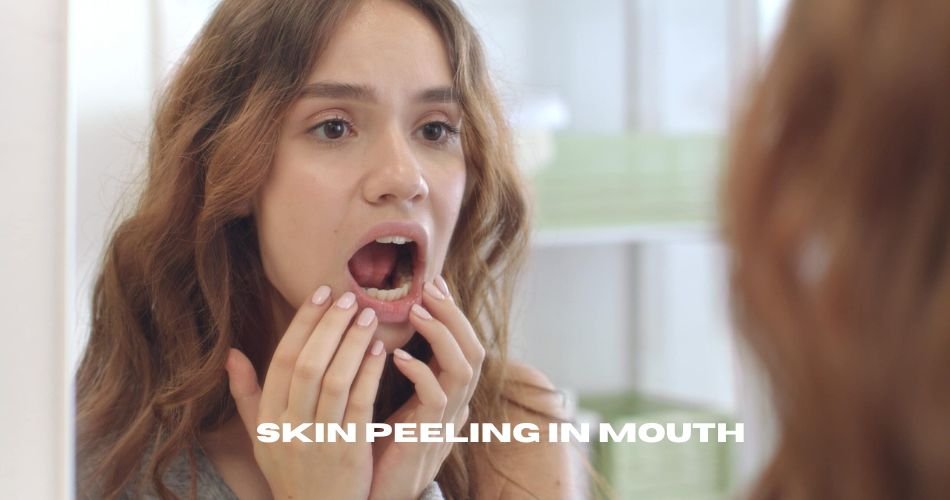Skin peeling in the mouth is an issue many people face at some point in their lives, yet it often goes unnoticed or is misunderstood. This condition can involve the inner cheeks, roof of the mouth, tongue, or gums, and may appear as thin, peeling layers of white or reddish skin sloughing off. For some, it’s just a minor annoyance that clears up on its own, while for others, it can signal something more serious and recurring. Skin peeling in mouth may result from external irritants, internal deficiencies, or even autoimmune conditions. While it might look scary, understanding what’s causing the peeling is the first step to managing and treating it effectively. In this article, we’ll dive deep into all aspects of skin peeling in the mouth and provide comprehensive insights into how to deal with it.
The Most Common Everyday Causes Behind Skin Peeling in Mouth
One of the most frequent reasons behind skin peeling in mouth is irritation caused by products we use every day. Toothpaste and mouthwashes, particularly those containing sodium lauryl sulfate (SLS), are notorious for irritating the oral mucosa. This chemical can dry out or irritate the lining of your mouth, leading to thin skin that peels away after brushing. Spicy and acidic foods like chili peppers, citrus fruits, or vinegar-based products can also play a role by causing chemical burns or minor inflammation, especially in people with sensitive mouths. Additionally, allergic reactions to ingredients in dental care items, candies, or even certain types of gum may present themselves as peeling, burning, or swollen areas inside the mouth. A less-known but important cause is trauma from rough brushing or poorly fitting dentures, which may repeatedly damage the soft tissue and cause it to shed layers.
Underlying Medical Conditions That May Cause Skin Peeling in Mouth
If skin peeling in mouth persists for weeks or keeps returning, it may be linked to a medical condition that requires proper diagnosis. Oral lichen planus is a common autoimmune disorder where the immune system mistakenly attacks the lining of the mouth, resulting in lacy white patches, redness, discomfort, and peeling. Pemphigus vulgaris, another autoimmune condition, causes blistering and severe skin sloughing inside the mouth and on other mucosal surfaces. Stevens-Johnson syndrome, a rare but serious condition, begins with flu-like symptoms and progresses into painful blistering and skin peeling, including the mouth’s inner lining. Nutritional deficiencies, especially those involving Vitamin B12, folic acid, or iron, can weaken the tissues of the oral cavity and lead to peeling, sensitivity, and even ulcers. Fungal infections like oral thrush can also result in white, peelable layers along with discomfort or a burning sensation, particularly in people with weakened immune systems.
Lifestyle Habits That Contribute to Skin Peeling in the Mouth
Apart from medical issues, some lifestyle habits significantly increase the risk of skin peeling in mouth. Tobacco use, whether through smoking or chewing, exposes the mouth to a range of chemicals that dry out and irritate the mucous membranes. Over time, this can result in peeling, discoloration, and increased sensitivity. Alcohol consumption works similarly by drying the tissues and creating an inhospitable environment for healthy cell renewal. Chronic dehydration is another overlooked cause—when your body doesn’t have enough water, the delicate tissue inside your mouth becomes more fragile and susceptible to damage. High stress levels can lead to unconscious habits like cheek biting, lip chewing, or jaw clenching. These actions may not seem significant, but they cause ongoing trauma to the soft tissues, leading to peeling over time. If skin peeling in mouth occurs regularly, assessing and changing these behaviors can make a substantial difference.
Recognizing the Symptoms and Appearance of Skin Peeling in Mouth
Skin peeling in the mouth doesn’t always look the same. Sometimes, it appears as thin, translucent layers of tissue that slough off when brushing or eating. In other cases, the affected area may look inflamed or present with red, raw patches where the skin has peeled. Some people notice white, stringy remnants of skin clinging to their gums or inner cheeks, often mistaken for food debris. Accompanying symptoms can include burning, stinging, or a metallic taste. In more serious cases, pain becomes severe enough to interfere with eating or speaking. Swelling, bleeding, and ulceration may also develop depending on the underlying cause. Monitoring the timing, duration, and associated symptoms can help narrow down the root of the issue and determine if professional medical help is needed.
Diagnosis and Medical Evaluation for Persistent Mouth Peeling
When skin peeling in mouth becomes a persistent issue, a medical or dental professional should evaluate the condition. The diagnosis typically begins with a visual examination to assess the appearance and extent of the peeling. If an allergic reaction is suspected, your doctor may conduct patch testing or recommend you stop using certain products for a while. Blood tests may be required to check for vitamin deficiencies, autoimmune markers, or systemic infections. If a chronic condition like oral lichen planus or pemphigus is suspected, a small biopsy of the affected tissue may be taken for laboratory analysis. This can help rule out other serious issues like precancerous lesions or oral cancers. Timely and accurate diagnosis ensures that the correct treatment plan is followed, preventing the condition from worsening or spreading.
Home Remedies That Can Help Relieve Skin Peeling in Mouth
In many cases, especially when peeling is caused by irritation or minor trauma, home remedies can provide significant relief. Rinsing your mouth with saltwater helps reduce inflammation, clean the area, and promote healing. Aloe vera gel, when used in small amounts, can soothe the affected areas with its natural anti-inflammatory and healing properties. Coconut oil pulling or rinsing not only moisturizes the tissues but also provides mild antibacterial protection. Avoiding spicy, acidic, and crunchy foods during the healing process can prevent further irritation. Keeping your mouth hydrated by drinking plenty of water and using sugar-free lozenges or chewing gum can also keep the mucosa healthy. Always make sure to switch to an SLS-free toothpaste if you’re experiencing ongoing irritation after brushing. These simple steps often yield noticeable improvements within a few days.
Over-the-Counter and Prescription Treatments for Skin Peeling in Mouth
If home care isn’t enough, over-the-counter or prescription treatments may be necessary. Topical corticosteroid gels or rinses are often prescribed for inflammatory conditions like oral lichen planus to reduce swelling and discomfort. Antihistamines can help if the issue is related to an allergic reaction, particularly when used in conjunction with avoidance of the triggering substance. Fungal infections may require antifungal mouthwashes or lozenges to clear the infection and restore the natural flora of the mouth. For individuals with nutritional deficiencies, supplements containing Vitamin B12, iron, or folic acid may be prescribed. In cases of bacterial infections or severe irritation, antibacterial rinses or antibiotics might be needed. It’s important to follow the treatment plan exactly as prescribed and report any side effects or lack of improvement to your healthcare provider.
When You Should Seek Professional Medical Attention
Not all cases of skin peeling in mouth require immediate medical attention, but certain red flags should not be ignored. If the condition persists for more than two weeks, keeps recurring, or worsens despite using home remedies, it’s time to see a doctor or dentist. Similarly, if the peeling is accompanied by severe pain, bleeding, pus, or fever, professional help is needed to rule out infection or systemic disease. Anyone experiencing difficulty eating, speaking, or swallowing should also consult a specialist. Persistent ulcers, large areas of peeling, or discoloration that doesn’t improve could be signs of a more serious underlying problem such as autoimmune disease or even oral cancer. Getting an early diagnosis can prevent complications and ensure the condition is managed effectively.
How to Prevent Skin Peeling in the Mouth in the Long Run
Prevention is often the best strategy when it comes to skin peeling in mouth. Start by switching to gentle, alcohol-free, and SLS-free oral hygiene products. Brush and floss regularly, but don’t scrub too hard or use overly stiff-bristled brushes. Maintain a balanced diet that includes plenty of vitamins, minerals, and hydration to support tissue repair and immune function. Avoid chewing tobacco, limit alcohol, and stay mindful of any unconscious oral habits like biting your cheek or lip. Protect your mouth from extreme hot or spicy foods if you notice sensitivity or irritation after eating them. Regular dental check-ups are key, as they allow professionals to detect early signs of irritation, infection, or other issues before they become severe.
The Emotional and Social Impact of Recurrent Mouth Peeling
Although it may seem like a small problem, skin peeling in mouth can impact your emotional and social life in meaningful ways. People often feel embarrassed or uncomfortable when they’re dealing with visible mouth issues or persistent pain. It can interfere with eating out, talking confidently, or even smiling in public. The anxiety of not knowing what’s causing the condition can also add stress, which in turn might worsen the symptoms. Those with recurring cases may avoid their favorite foods or social situations altogether, leading to isolation or reduced quality of life. Acknowledging the emotional toll is just as important as treating the physical symptoms. Talking to your doctor, dentist, or even a counselor can help ease both physical discomfort and emotional strain.
Conclusion
Skin peeling in the mouth is not just a cosmetic concern—it’s a signal from your body that something may be irritating, lacking, or out of balance. Whether it’s caused by harsh toothpaste, spicy foods, or something more complex like autoimmune disease or nutritional deficiency, it’s essential to pay attention to this seemingly minor symptom. Identifying the cause, applying appropriate home or medical treatments, and adopting preventive measures can help you reclaim comfort and confidence. When in doubt, always consult a healthcare provider to avoid complications and ensure long-term oral health.






